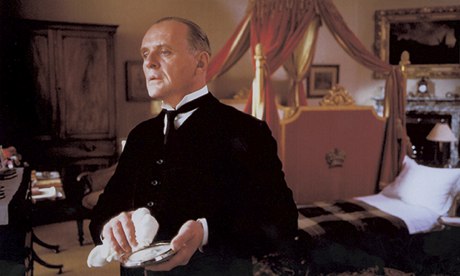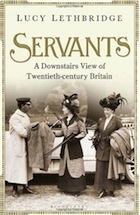
Polished performance … Anthony Hopkins in the film version of The Remains of the Day
Domestic service is most often used as the mood music of historical depiction; maids and footmen deftly slipping in and out of the background in scenes in which other people have the starring roles.
 Dive into the archives and scour the libraries, as I did when researching my book Servants: a downstairs view of 20-century Britain, and there is a surprisingly rich clamour of voices from the other side of the baize door.
Dive into the archives and scour the libraries, as I did when researching my book Servants: a downstairs view of 20-century Britain, and there is a surprisingly rich clamour of voices from the other side of the baize door.
Sometimes funny, quite often angry, occasionally nostalgic, they are the voices of an age.
Picking 10 favourites was very difficult – and I've included a few (fictional and factual) that are not autobiographical but enter the subject of our domestic history at another angle.
This was among the inspirations for Upstairs, Downstairs. Published in 1968, the high summer of the country house seemed already very far away. Powell became in old age a celebrity authority on life below stairs – although she had railed furiously against it in her years as a kitchen maid and cook. With her radical politics, her tart conversation and her size nine feet she must have been a formidable figure in the servants' hall. Her voice is intelligent, witty, observant, waspish and wise, and her memoir is a gripping portrait of the inter-war world of the upper-middle classes.
The rest here
 Dive into the archives and scour the libraries, as I did when researching my book Servants: a downstairs view of 20-century Britain, and there is a surprisingly rich clamour of voices from the other side of the baize door.
Dive into the archives and scour the libraries, as I did when researching my book Servants: a downstairs view of 20-century Britain, and there is a surprisingly rich clamour of voices from the other side of the baize door.Sometimes funny, quite often angry, occasionally nostalgic, they are the voices of an age.
Picking 10 favourites was very difficult – and I've included a few (fictional and factual) that are not autobiographical but enter the subject of our domestic history at another angle.
1. Below Stairs by Margaret Powell
This was among the inspirations for Upstairs, Downstairs. Published in 1968, the high summer of the country house seemed already very far away. Powell became in old age a celebrity authority on life below stairs – although she had railed furiously against it in her years as a kitchen maid and cook. With her radical politics, her tart conversation and her size nine feet she must have been a formidable figure in the servants' hall. Her voice is intelligent, witty, observant, waspish and wise, and her memoir is a gripping portrait of the inter-war world of the upper-middle classes.
2. Of Carriages and Kings by Frederick Gorst
A very different book, this autobiography, is in its way no less evocative than Margaret Powell's. Gorst went into service in his early teens, rising to become a first footman. His working life at the turn of the century was spent at the frillier end of the business, working in some of the grandest establishments in the country. Gorst loves the decadent pantomime of it all: the sumptuous livery, the calf pads that make a manservant's legs appear shapelier, the camaraderie of the servants' hall (he is less keen on the messy job of applying hair powder). The interest of his book lies chiefly in his portrait of Edwardian aristocrats whose idleness had left them devoid of any practical skills whatsoever. Gorst details their helpless, mad whimsicality with kindly, even superior, benevolence.The rest here
No comments:
Post a Comment